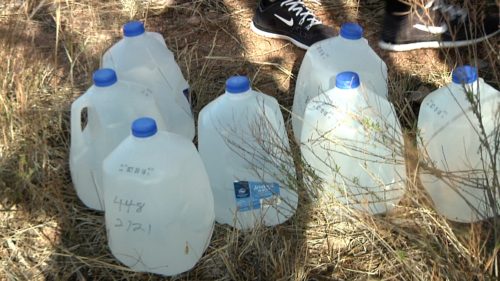
All the videos show the same scenario: A Border Patrol agent walks up to water jugs behind chollas and cacti, opens them up and dumps the water out.
Is it inhumane to destroy water and food for migrants crossing the border even if they are here undocumented?
In 2010, a video released showed a Border Patrol agent vandalizing water gallons left out in the desert trails for migrants crossing.
The video went viral.
Humanitarian groups, such as No More Deaths (No Más Muertes), wrote a three-part report gathering data from 2012-2015. The report was released in January, along with another video of several clips showing Border Patrol agents not only vandalizing water gallons, but also food and clothes left for crossing migrants.
According to the report, the remains of at least 7,000 migrants have been recovered along the U.S. borderlands in the last two decades. During the three-year data collection, the Pima County Office of Medical Examiner received the bodies of at least 593 migrants who had tried to cross the border. The major cause on these death cases are extreme heat, cold and dehydration.
Migrants do not come with enough water. They know they will be walking for days and do not want the weight.
Deborah McCullough, a volunteer with Tucson Samaritans and No More Deaths since 2004, has gone out to the desert routes to do the water drops. McCullough believes the actions of the Border Patrol agents are unconscionable and immoral to the human race, “I kind of think of that as the equivalent of something like premeditated murder,” McCullough said.
According to the No More Deaths report, 3,586 gallons of water were vandalized between March 2012 to December 2015.
After the 2010 video came out, Victor Manjarrez Jr., Border Patrol chief of the Tucson sector, issued a statement telling officers not to destroy the water, according to McCullough. After Manjarrez left the position later in 2010, the statement was not followed, she said.
According to McCullough, Randy Hill, who replaced Manjarrez as chief, claimed the statement was never in writing. Hill retired in 2011, and when humanitarian groups tried asking subsequent Tucson sector chiefs about the water vandalism, they would not receive an answer, McCullough said.
After a meeting between humanitarian groups and current Chief Rodolfo Karisch in January, Karisch “issued a directive to agents to leave water alone,” according to McCullough.
When contacted, Karisch’s office refused to comment on its water policy.
Avital Hazony, a graduate student in philosophy at the University of Arizona, said Border Patrol agents should stick to their responsibilities.
“Preventing people from having water and food is kind of irrelevant to their job,” she said.
Hazony has strong feelings on countries taking care of their own. “Their own country should take care of them and not Americans … it is not your responsibility to help people on the other side of the border,” Hazony said.
Still, she believes leaving water and saving lives is needed, as long as migrants aren’t being encouraged to keep crossing illegally.
Sister Jodi Cecilia, director of El Otro Lado, a program that teaches high school students about immigration issues, said acts of charity from humanitarian groups should not be vandalized because they are not hurting anyone – only helping to save lives.
“This is inhumane,” Cecilia said about damaging water supplies.
Noemi Salazar Mata is a reporter for Arizona Sonora News, a service from the School of Journalism with the University of Arizona. Contact her at [email protected].
Click here for a Word version of this story and high resolution photos.

